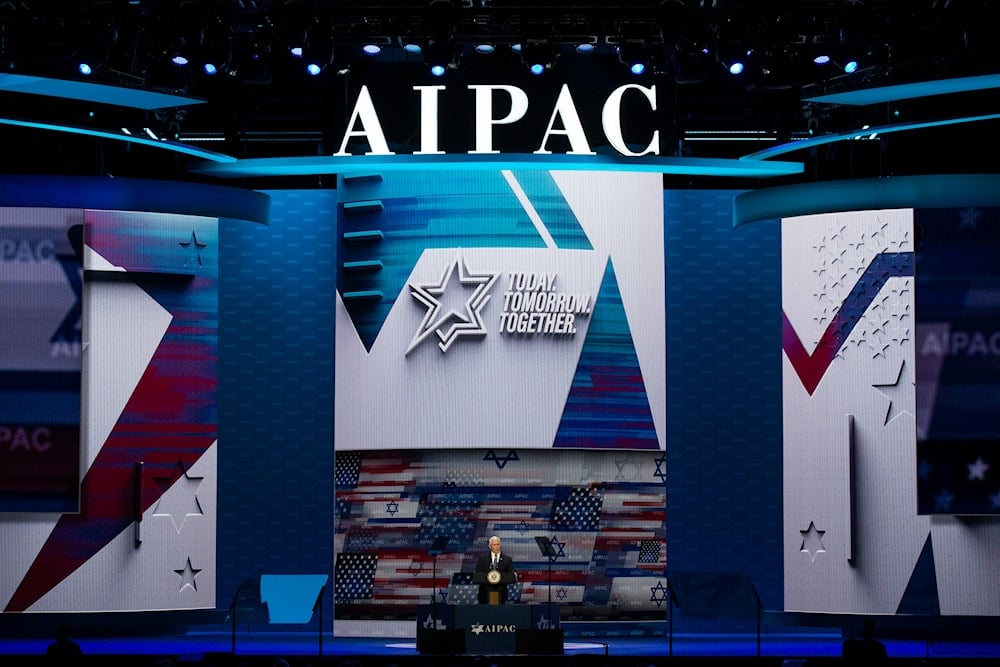Democrats break from AIPAC as war on Gaza shifts 'Israel' stance: NYT
With AIPAC’s influence waning, Democrats weigh new alliances as public opinion on Gaza, "Israel’s" war, and US arms sales shifts.
-

Then-Vice President Mike Pence speaks at the American Israel Public Affairs Committee (AIPAC) 2020 Conference, Monday, March 2, 2020, in Washington (AP)
For years, Representative Hakeem Jeffries, the Democratic leader in the House, maintained cordial ties with J Street, a center-left group advocating a "two-state solution" in the Middle East. Yet until recently, he never sought its endorsement, remaining firmly aligned with the American Israel Public Affairs Committee (AIPAC), the powerhouse pro-"Israel" lobby that has long funded his campaigns.
That changed last month, when Jeffries accepted J Street’s support for the first time. The move, reported by The New York Times’ Annie Karni, marked a symbolic win for J Street, which has been sharply critical of "Israel’s" government and is seeking to broaden its influence on Capitol Hill.
While the endorsement drew little notice in Washington, where J Street already supports the majority of Democratic lawmakers, Jeffries’s decision was notable.
The New York Democrat, often lampooned by critics as “AIPAC Shakur", had long been one of the group’s most reliable allies. His shift underscores a broader realignment among Democrats over "Israel" at a time when the war on Gaza has reshaped public opinion, Karni argued.
Declining brand for Democrats
With support for the ongoing Israeli war on Gaza waning among Democratic voters, AIPAC’s once unassailable position is eroding. Some lawmakers who relied heavily on the lobby’s financial backing are now refusing its donations. Its annual trip to "Israel", a rite of passage for new members of Congress, has seen a sharp decline in Democratic participation.
Even in the Senate, where bipartisan support for "Israel" has long been entrenched, a majority of Democrats have recently voted for legislation curtailing US arms sales to "Israel", directly opposing AIPAC’s stance.
AIPAC remains a formidable force, as per the author. Last year, it spent more than $23 million to unseat progressives Cori Bush and Jamaal Bowman, both outspoken critics of unconditional US aid to "Israel". It also poured more than $1 million into a primary in Oregon, helping Representative Maxine Dexter defeat Susheela Jayapal, sister of progressive leader Pramila Jayapal.
But even Dexter, once a beneficiary of AIPAC funding, has recently voiced opposition to weapons transfers to "Israel" and co-sponsored legislation tying arms sales to human rights conditions. AIPAC has not endorsed her this cycle.
Shifting political ground
The change reflects both evolving public sentiment and the growing gulf between Democrats and Israeli Prime Minister Benjamin Netanyahu. AIPAC has framed its Gaza genocide as a “just and moral” war against Hamas. Yet polls show American voters, especially Democrats, are increasingly sympathetic to Palestinians and critical of "Israel’s" military conduct.
Jeremy Ben-Ami, J Street’s president, said the group sees a turning point: “We are at a tipping point given what has happened over the last two years in Gaza, and the fact that AIPAC still maintains that all we can do is support the government of Israel — they’ve run into a wall.”
AIPAC spokesperson Marshall Wittmann countered that “the overwhelming majority” of Democrats still believe supporting "Israel" is “both good politics and good policy.” He cited last year’s House vote, 422 to 6 against cutting $500 million in defense aid, as proof of enduring bipartisan backing.
Fewer Democrats on the 'Israel' junket
One of AIPAC’s most potent tools has long been its educational trips to "Israel", as per the piece. But attendance among Democrats has dropped dramatically. In 2023, 24 House Democrats traveled with AIPAC, including Jeffries. This year, only 11 of the 33 first-term Democrats went, and several who initially signed up later withdrew amid backlash from constituents.
The political reshuffling is not confined to Democrats. On the right, Representative Marjorie Taylor Greene has denounced the Gaza campaign as a “genocide” and pushed to cut US defense funding for "Israel", an effort that failed overwhelmingly but signaled unease among some Republicans.
Greene has described AIPAC’s trips to "Israel" as attempts to “pull you in because they want to pull you on their side,” even as the group weighs targeting her in a future primary.
In all, the developments point to a significant recalibration of "Israel’s" place in American politics, as per the author.
While AIPAC continues to wield deep resources and influence, its once unchallenged dominance within the Democratic Party is facing an unprecedented test as lawmakers respond to a rapidly shifting electorate.

 4 Min Read
4 Min Read










